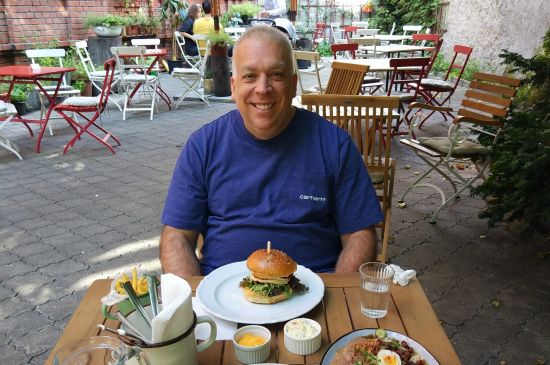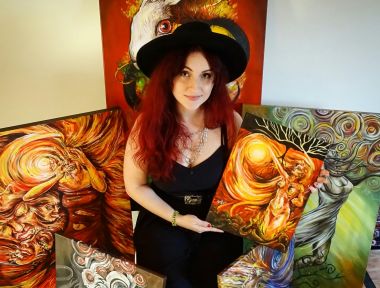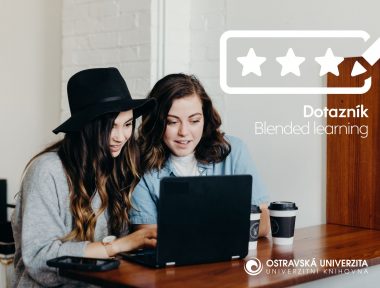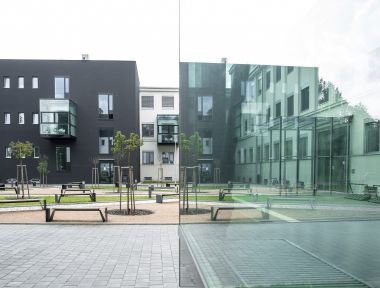Salvatore Alaimo was born and raised in New Jersey and has worked in the business and nonprofit sectors, so academia is his third career. He works now in his thirteenth year as a professor at Grand Valley State University, in Grand Rapids, Michigan, USA. There he teaches graduate courses in philanthropy and nonprofit administration including program evaluation and strategic management and planning. He has also produced two documentaries, What is Philanthropy? a feature length film about the concept of giving in the American context and Sew What?, a short film about a group of elderly women in a sewing group. He and his wife Wenjing will be here in Ostrava until March 15, 2023.
What is the topic of your research in Ostrava?
The title of the research study is The Evaluation Capacity of Czech Social Services Nonprofit Organizations.
The ultimate purpose is to help Czech Czech Social Services Nonprofits increase and enhance their evaluation capacity so their services will be more effective for whom they serve; they will enhance their accountability to external stakeholders; and they will contribute to the social betterment of the communities they serve.
Could you describe in a few sentences your research (main goals, expectations etc.)?
This exploratory study will determine the capacity of Czech Social Services Nonprofits to have their services formally evaluated. It will examine capacity issues such as leadership, culture, resources, structures and others. In addition to analyzing, publishing and presenting the results, recommended practice for addressing each of these capacity issues will be included. The ultimate purpose is to help Czech Czech Social Services Nonprofits increase and enhance their evaluation capacity so their services will be more effective for whom they serve; they will enhance their accountability to external stakeholders; and they will contribute to the social betterment of the communities they serve.
Why did you choose the Czech Republic for your research?
I didn‘t search Fulbright Scholarshp Awards by country and instead searched by my discipline and background. The Fulbright-Masaryk Award in NGO Mnagaement was a perfect fit. Given that it is located here, I thought about a study that would fit my research background but also serve a need here and help local organizations.
How did you learn about the possibility of cooperation with the University of Ostrava?
The Czech Fulbright Commission recommended three universities that have programs that to some degree fit my teaching and research background, and the University of Ostrava was one of them.
Did you consider a different Czech university for your research?
Yes, I considered Charles University and Masaryk University.
Is your research going as planned?
As with any research study there are always glitches and obstacles, but so far we remain on schedule. We have made adjustments to accommodate Czech context, culture and language so we are dealing with those issues now but we are close to launching our national online survey. It should be out before this is published. Then we move to semi-structured interviews in hopefully three different regions of the Czech Republic. The study remains on schedule largely because of my two outstanding colleagues, Jakub Pejcal, a professor from Masaryk University, and Simona Lipková, a PhD student at Charles University. Working with them continues to be a wonderful experience.
Did anything in the research take a different course than planned?
Yes, after we pre-tested the survey at Masaryk University, in Brno, with three directors of social services organizations their feedback indicated we needed to make some changes to the survey which we have completed. But this is why it is important to pre-test your research instruments, so maybe we did expect those changes.
About Life in Ostrava
Whenever we have walked around the city and have needed help, people don‘t hesitate to help use even if their English is not so good. I remember one kind young woman who willingly missed her bus to help us.
How do you evaluate your stay in Ostrava?
My wife and I have been here now for two months, so we still will wait until March to give a more complete evaluation. Up to now our biggest challenges have been housing and finding a doctor. Beyond those issues we have enjoyed our stay here and are still exploring the city. We take frequent walks along the river and to Komensky Park. HogoFogo and Nha Cretcheu Café & Restaurant are wonderful restaurants. Their food is of high quality, and I recommend them. Whenever we have walked around the city and have needed help, people don‘t hesitate to help use even if their English is not so good. I remember one kind young woman who willingly missed her bus to help us. We appreciate such kindness.
Which place did you like the most?
I enjoyed the science center at Dolní Vítkovice and hope to see the rest of it soon. We also look forward to performances at Gong Concert Hall and to seeing the planetárium.
Is there anything else that you found pleasantly surprising in Ostrava?
The public transportation system is simply outstanding. You can get anywhere in the city cheaply and it runs on time. The trains from Ostrava to other cities are great, too and we have taken them to Prague and Brno so far and hope to go to Vienna for the Christmas holiday. Cities the size of Ostrava in the U.S. do not have such public transportation. And our nation never properly invested in passenger rail service. Another pleasant surprise is the baked goods here are fantastic. I was told they were good, but I didn‘t know they were this good.
How pleased are you with your experience at the University of Ostrava?
The welcome reception with the Faculty of Social Studies hosted by Dean Alice Gojova and Vice-Dean for Foreign Affairs Marie Špiláčková was nice. At another meeting, it was great to meet Rector Jan Lata who had good questions to ask and insights into higher education here. Vice-Rector Renata Tomášková was instrumental in arranging that meeting and also in connecting me with the local American Center. Tomáš Matuška in Informational Technology is outstanding, so much I’d like to steal him and take him back to my university in the U.S. I have spent many hours in the library, and their staff have been helpful. It’s a nice, quiet space where I can get a lot of work done. I enjoyed breakfast with Petr Kopecký where we talked about our countries and his focus areas of British and American Studies. I hope we can continue our dialogue. Michaela Vontorová has been extremely helpful in navigating the city and tending to our many needs, especially issues concerning language. My wife and I greatly appreciate her and her husband Roman’s friendship. Overall, the Faculty of Social Studies have been kind and friendly. I look forward to more opportunities with them in the remaining months of my visit.
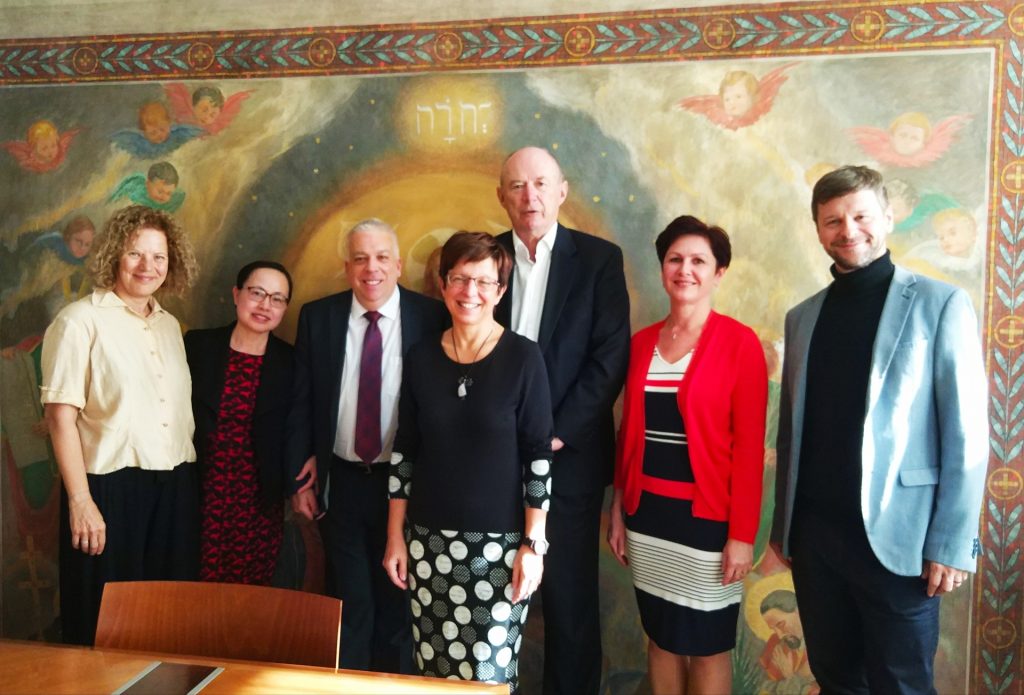
You gave some lectures for the Czech students as well as for the foreign students. Did you enjoy it?
I really enjoyed teaching the students in the ICPM Program (Intercultural Project Management). There were fifteen total and they came mostly from Austria with a few from Taiwan and one from Italy. I also coach a group of them for their service learning project with Rainbow House, a local nonprofit that serves people with disabilities. They turn in their final paper in December.
One is when I began collecting chestnuts in Komensky Park thinking I would roast them in the oven. Luckily I looked up chestnuts online and realized they were poisonous horse chestnuts that could make us violently ill, so I threw them all out.
Do you have some funny experiences?
Oh my goodness, yes! One is when I began collecting chestnuts in Komensky Park thinking I would roast them in the oven. Luckily I looked up chestnuts online and realized they were poisonous horse chestnuts that could make us violently ill, so I threw them all out. Now I know why the people in the park stared at me strangely as I collected them. They probably thought I was nuts! Another is discovering we had been washing our clothes with fabric softener for almost a month because we didn‘t take the time to translate the label. We have too many funny stories while trying to find an apartment, so I’ll just pick one. A real estate agent told us the owner wanted to know what nationality we were because he only rented to people who spoke Czech. Maybe that’s not so funny, but we laughed anyway.
Comparing the Czech Republic and the U.S.
What does the field of social work look like in the Czech Republic and in the U.S.?
In the U.S. the field continues to grow as the government devolves its role and responsibility in social services and defers it to nonprofit organizations. Growth is also driven by a growing and aging population that has increasing and more complex health and social needs. The U.S. has more children in hunger than in any period in modern history. One more factor that we might consider positive is the advancement and progression of policies that concern people needing social services. In 1990 our president signed the Americans with Disabilities Act (ADA) requiring among other things, buildings to be accessible, technology to accommodate disabilities and the protection of rights. Now, with so many institutions engaging in Diversity, Equity and Inclusion (DEI) initiatives, people requiring social services are getting more attention and consideration. In spite of growing demand, challenges with supply of educated, trained, qualified and professional social workers remains a great challenge due to the extremely low rate of compensation. My hope is that our society will realize, appreciate and properly value the amazing work that people do to help those who often do not have a voice or are marginalized in society. It is discouraging when an MSW in the U.S. makes the same rate of pay as someone at McDonalds or Starbucks. To me, that represents our country’s priorities are not properly aligned.
I am still learning about social work in the Czech Republic and hope to know more in the coming months. Reading books in the OSU library, speaking to Faculty of Social Studies colleagues and meeting directors of social services organizations has helped. It seems the same problem of not properly compensating social workers exists here, too. The field is evolving and becoming more professionalized as in the U.S. My hope is that a similar movement to care for the caregivers takes off here, if it hasn’t already, as it recently has in the U.S.
Are there any differences in social work between these two countries?
I am still learning about the comparison. I know our master’s programs are accredited by the National Association of Social Workers (NASW) and they have a 60 credit requirement, also with a code of ethics for the profession. I am not sure what the equivalent looks like here in the Czech Republic. It seems the revenue mixes of social services organizations, what we often call in the U.S. human services organizations, are somewhat similar with funding from government, individuals, businesses and foundations and individuals. But here there is more reliance on the Czech government and the EU Social Investment Fund, where as in the U.S. you would see larger slices of the funding pie come from those other sources. Maybe as private giving continues to grow here in the Czech Republic you might see those revenue mixes change.
Outside your field, what do you miss in the Czech Republic?
I miss the West Michigan fall season where the leaves on the trees turn bright mixes of yellow, red and orange. We pick apples, pumpkins, get freshly pressed apple cider and freshly made donuts. It’s my favorite season of the year. I also miss the ease of accessing a doctor, dentist and getting the proper care. Our healthcare provider in Grand Rapids, Spectrum Health, provides free translation services in many languages for patients. Here, we were told by a doctor’s nurse or receptionist who answered the phone in Brno, who had a web site in English and stated he treated foreigners, that we must speak Czech before hanging up on me. No doctor in Ostrava would take us as patients, so I had to contact the Fulbright Commission in Prague to make a call for us and get an appointment. I have been told that people here go to Poland for their dental care. So, the systems, processes and cultures are a bit different. Also, less people smoke in the U.S. My wife and I have had to walk around cigarette smoke in many entrances of buildings and places, and on sidewalks here where smokers gather. It was determined that cigarette smoke causes lung cancer in 1964. We have probably inhaled more cigarette smoke in two months than we have in the past five years back home in the U.S.
Would you recommend an internship in the Czech Republic to your American colleagues?
I would not, unless housing and healthcare are settled for them in advance of their arriving. If not, these important issues are a major disruption in the person’s life which take an enormous amount of time and attention away from teaching, research and enjoying the host country.
My hope is to also make connections and form relationships that will extend beyond our stay here in Ostrava and continue when we return home to the U.S. Maybe someday I can host a Czech Fulbright Scholar at my university or we can have a few Czech graduate students in our program.
Is it possible to learn from each other and apply examples of good practice?
Absolutely. I just began reading the Palgrave Handbook of Global Social Work Education in which OSU faculty have published a chapter. That book alone tells us how much we can and should learn from each other and that social work is a global profession. Within nonprofit management, my area of focus, there are two organizations I recommend for any Czech scholar with these interests. One is the Association for Research on Nonprofit Organizations and Voluntary Action (ARNOVA). They are based in the U.S. but are an international organization with growing international membership from around the world. They are home to the academic journal Nonprofit and Voluntary Sector Quarterly, and their annual conference has research presentations and great networking opportunities. The other is International Society for Third Sector Research (ISTR). They are home to the academic journal Voluntas, a recommended read, and they have a bi-annual international conference, also with research presentations and networking opportunities. There is plenty we can learn from each other. There is much to be gained from each other through exchange, cooperation and relations, which is what the Fulbright Scholarship is all about.
What did you learn about the concept of registered social services in the Czech Republic and how will you work with the results of the research? Will you transfer the outcomes to the context of your field?
I have learned that the Ministry of Labor and Social Affairs is the governing and regulatory agency for social services organizations in the Czech Republic. I also have learned of the importance of the European Union Social Investment Fund for the financial support of Czech social services organizations. For my research topic on evaluation capacity, in the limited time I have spent researching it so far, it seems there are parallels between the Czech and American contexts that make the main issues transferrable. I will know more once we receive the results of the survey and conduct the interviews. My biggest hope is that the research through reporting results and conveying recommended practice will help Czech nonprofit organizations build capacity for the evaluation of their social services.
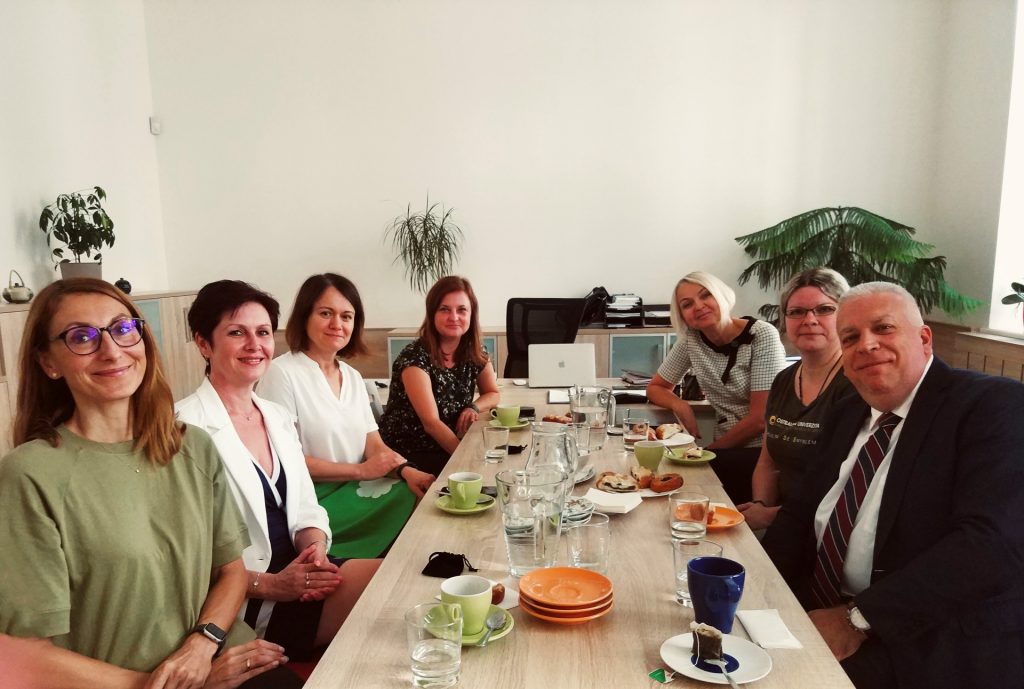
Has your internship abroad given rise to a new international cooperation, and in what framework?
There has been a mix of informal and formal cooperation during my stay here over these two months. The more informal is regular when I interact with my OSU colleagues, and we learn how we do things in our respective countries. The more formal will come soon when I make presentations at the American Centers in Plzen and here in Ostrava. The U.S. Embassy strongly believes in international relations and cooperation, and so do I, so I look forward to those opportunities. My hope is to also make connections and form relationships that will extend beyond our stay here in Ostrava and continue when we return home to the U.S. Maybe someday I can host a Czech Fulbright Scholar at my university or we can have a few Czech graduate students in our program. I will continue to think of more ways we can take advantage of this wonderful opportunity for international cooperation.


 14 min.
14 min. 